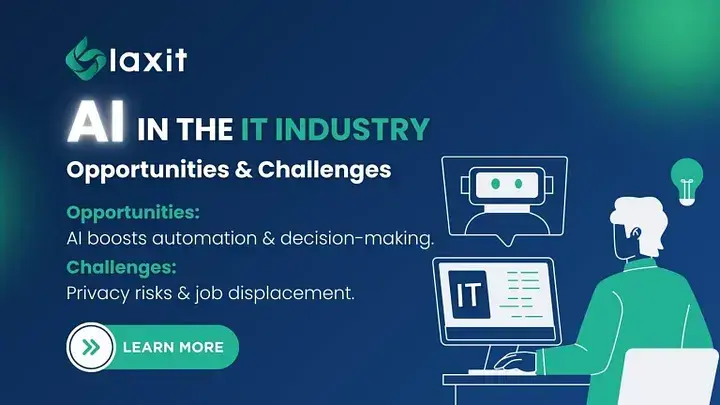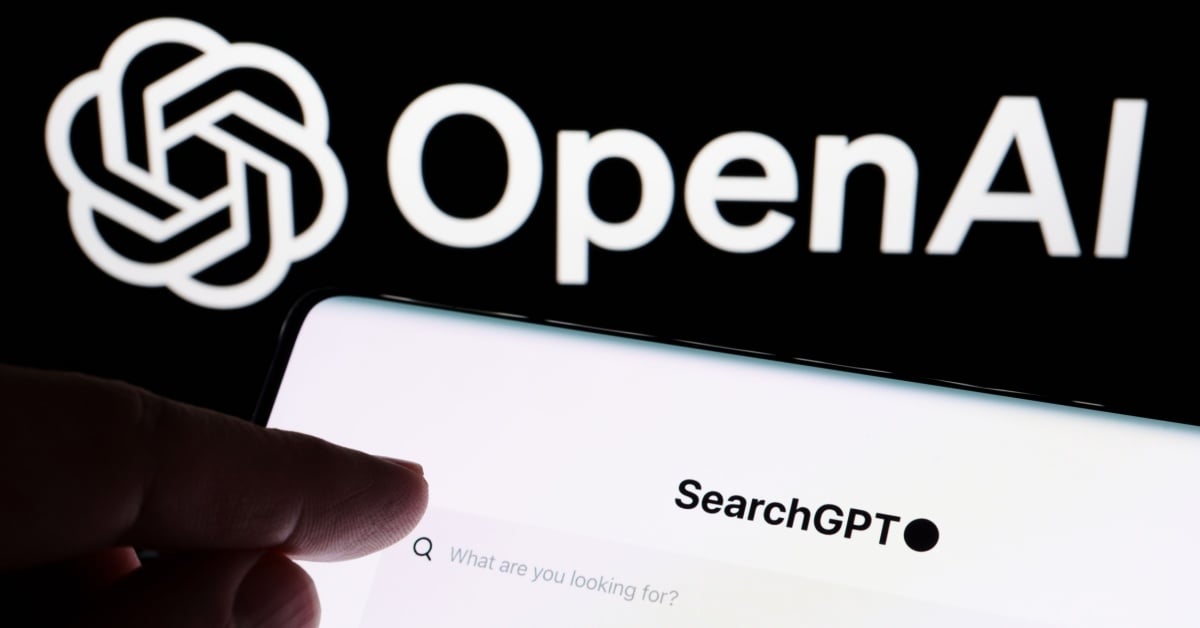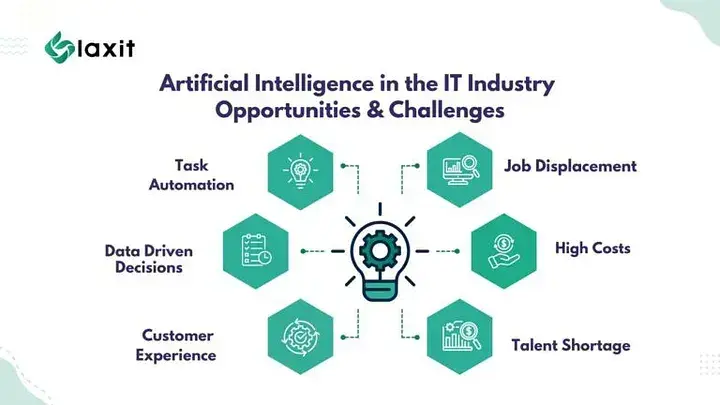Artificial Intelligence In The IT Industry Opportunities & Challenges
Introduction Artificial Intelligence (AI) is revolutionizing the IT industry, bringing groundbreaking advancements in automation, cybersecurity, data management, and software development. As AI continues to evolve, it presents numerous opportunities for enhancing IT operations and services. However, it also introduces ethical concerns, security risks, and job displacement. This article explores the role of AI in the IT industry, highlighting its opportunities and challenges while providing insights into the future of AI in technology. Opportunities of AI in the IT Industry Automation of Repetitive Tasks AI-driven automation transforms IT operations by eliminating manual tasks, reducing errors, and improving efficiency. How AI Reduces Manual Work AI-powered tools can handle repetitive tasks such as system monitoring, troubleshooting, and network optimization. IT administrators can focus on strategic decision-making while AI manages routine operations. Robotic Process Automation (RPA) allows businesses to automate workflows, improving productivity. AI-Driven Automation Tools Automated Ticketing Systems — AI-driven platforms like ServiceNow automate IT support and incident management. Intelligent Process Automation (IPA) — AI improves automation by incorporating machine learning and decision-making capabilities. Enhanced Cybersecurity Measures AI plays a vital role in cybersecurity by identifying threats and mitigating risks before they cause damage. Machine Learning in Cybersecurity Machine learning (ML) helps identify malicious patterns in information and data. AI clarifies authentication methods like biometric verification and behavioral analysis. AI-driven threat intelligence platforms predict potential cyber risks before they occur. Improved Data Management & Analytics AI can help IT professionals process, analyze, and utilize vast amounts of data more effectively. AI in Big Data Processing AI enhances data classification and retrieval for better efficiency. Cloud-based AI solutions assist in seamlessly managing structured and unstructured data. AI-powered databases boost query processing and data indexing. Predictive Analytics & Decision-Making AI enables predictive analytics to forecast trends and business outcomes. IT companies use AI to analyze customer behavior and enhance user experience. AI-powered business intelligence tools like Tableau and Power BI automate data insights. AI for Code Generation & Debugging AI-powered code assistants like GitHub and Copilot assist developers in writing better code. AI detects Coding errors and suggests improvements. AI reduces development time by automating repetitive Coding & microservices tasks. Challenges of AI in the IT Industry Data Privacy & Security Concerns AI processes various amounts of sensitive data, raising concerns about privacy and security. Risks of AI in Data Processing AI systems can be vulnerable to data breaches and hacking attempts. AI-based algorithms require access to large datasets, increasing the risk of data exposure. Organizations must ensure compliance with data protection regulations such as GDPR and CCPA. Ethical Considerations in AI AI decision-making can be opaque, making it difficult to ensure accountability. Ethical concerns arise when AI is used for data tracking. IT companies must prioritize transparency and fairness in AI implementations. Need for Skilled AI Professionals The AI talent gap is a major hurdle for IT companies implementing AI-driven software services & solutions. AI Talent Gap in the IT Industry AI experts like data scientists and machine learning engineers are in demand. The shortage of AI talent makes it difficult for companies to scale AI solutions. IT professionals must continuously upskill to stay relevant in an AI-driven landscape. Training & Upskilling IT Professionals Companies must invest in AI training programs for employees. Online AI courses and certifications help IT professionals gain AI expertise. Collaboration between academia and industry can bridge the AI skill gap. Dependency on AI & Job Displacement AI automation raises concerns about unemployment and workforce displacement Future of AI in the IT Industry Upcoming Trends in AI & IT AI continues to evolve, shaping the future of the IT industry. AI & IoT Integration AI-powered IoT devices enhance automation in industries like healthcare and manufacturing. AI-driven edge computing enables faster data processing in IoT networks. Smart cities leverage AI and IoT for intelligent infrastructure management. Quantum Computing & AI Quantum AI promises breakthroughs in data analysis and encryption. AI and quantum computing will revolutionize complex problem-solving in IT. Companies like IBM and Google are investing in quantum AI research. Conclusion AI is reshaping the IT industry, offering transformative automation, cybersecurity, data analytics, and cloud computing opportunities. However, its adoption comes with challenges, including se

Introduction
Artificial Intelligence (AI) is revolutionizing the IT industry, bringing groundbreaking advancements in automation, cybersecurity, data management, and software development. As AI continues to evolve, it presents numerous opportunities for enhancing IT operations and services. However, it also introduces ethical concerns, security risks, and job displacement.
This article explores the role of AI in the IT industry, highlighting its opportunities and challenges while providing insights into the future of AI in technology.
Opportunities of AI in the IT Industry
Automation of Repetitive Tasks
AI-driven automation transforms IT operations by eliminating manual tasks, reducing errors, and improving efficiency.
How AI Reduces Manual Work
AI-powered tools can handle repetitive tasks such as system monitoring, troubleshooting, and network optimization.
IT administrators can focus on strategic decision-making while AI manages routine operations.
Robotic Process Automation (RPA) allows businesses to automate workflows, improving productivity.
AI-Driven Automation Tools
Automated Ticketing Systems — AI-driven platforms like ServiceNow automate IT support and incident management.
Intelligent Process Automation (IPA) — AI improves automation by incorporating machine learning and decision-making capabilities.
Enhanced Cybersecurity Measures
AI plays a vital role in cybersecurity by identifying threats and mitigating risks before they cause damage.
Machine Learning in Cybersecurity
Machine learning (ML) helps identify malicious patterns in information and data.
AI clarifies authentication methods like biometric verification and behavioral analysis.
AI-driven threat intelligence platforms predict potential cyber risks before they occur.
Improved Data Management & Analytics
AI can help IT professionals process, analyze, and utilize vast amounts of data more effectively.
AI in Big Data Processing
AI enhances data classification and retrieval for better efficiency.
Cloud-based AI solutions assist in seamlessly managing structured and unstructured data.
AI-powered databases boost query processing and data indexing.
Predictive Analytics & Decision-Making
AI enables predictive analytics to forecast trends and business outcomes.
IT companies use AI to analyze customer behavior and enhance user experience.
AI-powered business intelligence tools like Tableau and Power BI automate data insights.
AI for Code Generation & Debugging
AI-powered code assistants like GitHub and Copilot assist developers in writing better code.
AI detects Coding errors and suggests improvements.
AI reduces development time by automating repetitive Coding & microservices tasks.
Challenges of AI in the IT Industry
Data Privacy & Security Concerns
AI processes various amounts of sensitive data, raising concerns about privacy and security.
Risks of AI in Data Processing
AI systems can be vulnerable to data breaches and hacking attempts.
AI-based algorithms require access to large datasets, increasing the risk of data exposure.
Organizations must ensure compliance with data protection regulations such as GDPR and CCPA.
Ethical Considerations in AI
AI decision-making can be opaque, making it difficult to ensure accountability.
Ethical concerns arise when AI is used for data tracking.
IT companies must prioritize transparency and fairness in AI implementations.
Need for Skilled AI Professionals
The AI talent gap is a major hurdle for IT companies implementing AI-driven software services & solutions.
AI Talent Gap in the IT Industry
AI experts like data scientists and machine learning engineers are in demand. The shortage of AI talent makes it difficult for companies to scale AI solutions. IT professionals must continuously upskill to stay relevant in an AI-driven landscape.
Training & Upskilling IT Professionals
Companies must invest in AI training programs for employees. Online AI courses and certifications help IT professionals gain AI expertise. Collaboration between academia and industry can bridge the AI skill gap.
Dependency on AI & Job Displacement
AI automation raises concerns about unemployment and workforce displacement
Future of AI in the IT Industry
Upcoming Trends in AI & IT
AI continues to evolve, shaping the future of the IT industry.
AI & IoT Integration
AI-powered IoT devices enhance automation in industries like healthcare and manufacturing.
AI-driven edge computing enables faster data processing in IoT networks.
Smart cities leverage AI and IoT for intelligent infrastructure management.
Quantum Computing & AI
Quantum AI promises breakthroughs in data analysis and encryption.
AI and quantum computing will revolutionize complex problem-solving in IT.
Companies like IBM and Google are investing in quantum AI research.
Conclusion
AI is reshaping the IT industry, offering transformative automation, cybersecurity, data analytics, and cloud computing opportunities. However, its adoption comes with challenges, including security risks, ethical concerns, and workforce displacement. To maximize the benefits of AI while addressing its challenges, businesses must invest in talent development, ethical AI practices, and regulatory compliance.
As AI advances, IT companies must balance automation and human expertise, ensuring a future where AI enhances innovation while maintaining ethical standards.
FAQs
How does AI improve IT security?
AI enhances IT security by detecting threats in real-time, analyzing network traffic, and providing automated threat responses. AI-driven tools help prevent cyberattacks by identifying vulnerabilities and mitigating risks.What are the biggest challenges of AI in IT?
The major challenges of AI in IT include data privacy concerns, high implementation costs, AI bias, ethical considerations, and the need for skilled AI professionals.Can AI replace IT professionals?
While AI automates many IT tasks, it cannot fully replace human expertise. IT professionals must upskill to work alongside AI and focus on areas that require critical thinking and creativity.What are the ethical concerns related to AI in IT?
Ethical concerns include AI bias, lack of transparency, privacy violations, and the potential misuse of AI for surveillance or decision-making that impacts individuals unfairly.How will AI shape the future of the IT industry?
AI will drive automation, enhance cybersecurity, and revolutionize cloud computing, software development, and IT support. The future of IT will be centered around AI-driven solutions and human-AI collaboration.










































































![Apple Shares Official Teaser for 'Highest 2 Lowest' Starring Denzel Washington [Video]](https://www.iclarified.com/images/news/97221/97221/97221-640.jpg)

![New Powerbeats Pro 2 Wireless Earbuds On Sale for $199.95 [Lowest Price Ever]](https://www.iclarified.com/images/news/97217/97217/97217-640.jpg)
![Under-Display Face ID Coming to iPhone 18 Pro and Pro Max [Rumor]](https://www.iclarified.com/images/news/97215/97215/97215-640.jpg)











































































































































































































































![[The AI Show Episode 145]: OpenAI Releases o3 and o4-mini, AI Is Causing “Quiet Layoffs,” Executive Order on Youth AI Education & GPT-4o’s Controversial Update](https://www.marketingaiinstitute.com/hubfs/ep%20145%20cover.png)





































































































































































































.jpeg?#)



























































![[REPOST] Installing Genymotion for Android App Pentesting: The Definitive Guide](https://media2.dev.to/dynamic/image/width=800%2Cheight=%2Cfit=scale-down%2Cgravity=auto%2Cformat=auto/https%3A%2F%2Fdev-to-uploads.s3.amazonaws.com%2Fuploads%2Farticles%2F7zx2oyrfun6gecomzwf2.png)
